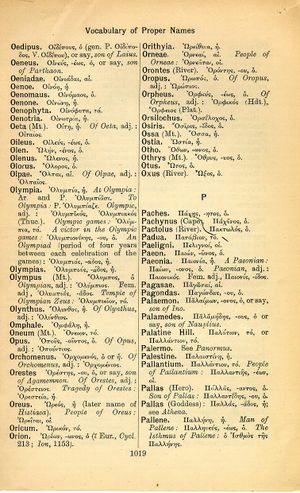Olympus: Difference between revisions
(6_11) |
m (Text replacement - "]]>" to "]]") |
||
| Line 7: | Line 7: | ||
}} | }} | ||
{{Lewis | {{Lewis | ||
|lshtext=<b>Ŏlympus</b>: 1, m.,<br /><b>I</b> a [[famous]] fluteplayer, [[pupil]] of [[Marsyas]], Ov. M. 6, 393; id. P. 3, 3, 42; Hyg. Fab. 165; Plin. 36, 5, 4, § 29.<br /><b>Ŏlympus</b>: and -pos ([[anciently]] written Olĭmpus), i, m., = [[Ὄλυμπος]] | |lshtext=<b>Ŏlympus</b>: 1, m.,<br /><b>I</b> a [[famous]] fluteplayer, [[pupil]] of [[Marsyas]], Ov. M. 6, 393; id. P. 3, 3, 42; Hyg. Fab. 165; Plin. 36, 5, 4, § 29.<br /><b>Ŏlympus</b>: and -pos ([[anciently]] written Olĭmpus), i, m., = [[Ὄλυμπος]].<br /><b>I</b> The [[name]] of [[several]] mountains, the [[most]] [[celebrated]] of [[which]] is one on the borders of [[Macedonia]] and [[Thessaly]] ([[now]] Lacha), of [[great]] [[height]], and [[consequently]] regarded as the [[seat]] of the gods, Mel. 2, 3, 2; 4, 8, 15: Musae quae pedibus magnum pulsatis Olimpum, Enn. ap. Varr. L. L. 7, § 20 Müll.: his diis Helicona [[atque]] Olympon attribuerunt homines, Varr. R. R. 3, 16, 7: [[frondosus]], Verg. G. 1, 282: [[opacus]], Hor. C. 3, 4, 52: [[nubes]] excedit [[Olympus]], Luc. 2, 271.—<br /> <b>B</b> Transf., [[poet]]. for [[heaven]]: [[caelum]] dicunt [[Graeci]] Olympum, Varr. L. L. 7, § 20; Verg. E. 6, 86: [[longus]] [[Olympus]], the [[distant]] heavens, id. G. 3, 223: annuit ([[Juppiter]]) et totum nutu tremefecit Olympum, id. A. 9, 106: [[stelliger]], Sen. Herc. Oet. 1907.—Hence, Ŏlympĭădes, um, f., the Muses (perh. [[only]] acc. to the foll. [[remark]]): [[caelum]] dicunt [[Graeci]] Olympum montem in Macedoniā omnes, a quo [[potius]] [[puto]] Musas dictas Olympiadas, Varr. L. L. 7, § 20.—<br /><b>II</b> Of [[other]] mountains.<br /> <b>A</b> In [[Bithynia]], Plin. 5, 32, 43, § 148.—<br /> <b>B</b> In [[Mysia]], Plin. 5, 32, 40, § 142.—<br /> <b>C</b> In [[Galatia]], Liv. 38, 18, 15; 38, 20, 2.—<br /> <b>D</b> In [[Lycia]], Plin. 21, 6, 17, § 31. —<br /> <b>E</b> In [[Ionia]], Plin. 5, 29, 31, § 118.—<br /> <b>F</b> In [[Peloponnesus]], Serv. ad Verg. A. 8, 352.<br /><b>Ŏlympus</b>: i, f.,<br /><b>I</b> a [[city]] in [[Cilicia]], named from a neighboring [[mountain]], [[now]] the ruins of Deliktash: Olympum cepit, urbem antiquam et omnibus rebus auctam, Cic. Verr. 2, 1, 21, § 56 (Zumpt N. cr.); Flor. 3, 6, 5; Eutr. 6, 3.—<br /><b>II</b> A [[city]] of [[Lycia]], named from a neighboring [[mountain]], Cic. Ac. 1, 21, 56. | ||
}} | }} | ||
Revision as of 09:30, 13 August 2017
English > Greek (Woodhouse)
(Mt.) Ὄλυμπος, ὁ
Olympian, adj.: Ὀλύμπιος. Fem. adj., Ὀλυμπιάς, -άδος.
Temple of Olympian Zeus: Ὀλυμπιεῖον, τό.
Latin > English (Lewis & Short)
Ŏlympus: 1, m.,
I a famous fluteplayer, pupil of Marsyas, Ov. M. 6, 393; id. P. 3, 3, 42; Hyg. Fab. 165; Plin. 36, 5, 4, § 29.
Ŏlympus: and -pos (anciently written Olĭmpus), i, m., = Ὄλυμπος.
I The name of several mountains, the most celebrated of which is one on the borders of Macedonia and Thessaly (now Lacha), of great height, and consequently regarded as the seat of the gods, Mel. 2, 3, 2; 4, 8, 15: Musae quae pedibus magnum pulsatis Olimpum, Enn. ap. Varr. L. L. 7, § 20 Müll.: his diis Helicona atque Olympon attribuerunt homines, Varr. R. R. 3, 16, 7: frondosus, Verg. G. 1, 282: opacus, Hor. C. 3, 4, 52: nubes excedit Olympus, Luc. 2, 271.—
B Transf., poet. for heaven: caelum dicunt Graeci Olympum, Varr. L. L. 7, § 20; Verg. E. 6, 86: longus Olympus, the distant heavens, id. G. 3, 223: annuit (Juppiter) et totum nutu tremefecit Olympum, id. A. 9, 106: stelliger, Sen. Herc. Oet. 1907.—Hence, Ŏlympĭădes, um, f., the Muses (perh. only acc. to the foll. remark): caelum dicunt Graeci Olympum montem in Macedoniā omnes, a quo potius puto Musas dictas Olympiadas, Varr. L. L. 7, § 20.—
II Of other mountains.
A In Bithynia, Plin. 5, 32, 43, § 148.—
B In Mysia, Plin. 5, 32, 40, § 142.—
C In Galatia, Liv. 38, 18, 15; 38, 20, 2.—
D In Lycia, Plin. 21, 6, 17, § 31. —
E In Ionia, Plin. 5, 29, 31, § 118.—
F In Peloponnesus, Serv. ad Verg. A. 8, 352.
Ŏlympus: i, f.,
I a city in Cilicia, named from a neighboring mountain, now the ruins of Deliktash: Olympum cepit, urbem antiquam et omnibus rebus auctam, Cic. Verr. 2, 1, 21, § 56 (Zumpt N. cr.); Flor. 3, 6, 5; Eutr. 6, 3.—
II A city of Lycia, named from a neighboring mountain, Cic. Ac. 1, 21, 56.

